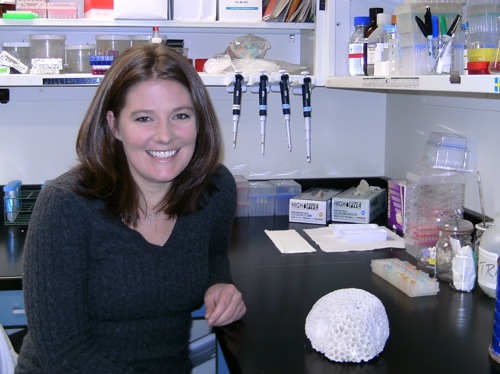Congratulations on saving the North Reef! Coral bleaching is a serious problem and has destroyed many reefs, but because of your action we have saved the North Reef from a bleaching event. Once again we have two beautiful healthy reefs!
Since bleaching is such a serious problem, many scientists all over the world are studying it. They are trying to figure out what causes bleaching and how we can stop it. One of my research assistants here at The Field Museum, Jillian Henss, studies coral bleaching. I had a chat with her and she explained her research and why she loves science!
MarkEOL: Hi Jillian! First, can you tell Whyville how you got into science and why you study corals?
Jillian Henss: Sure! Well, I always loved science when I was in school, especially biology. I studied exercise science (they study of how the body moves) in college. I liked it, but over time I realized that I loved nature and studying ecosystems more. So, I went back to school and got my masters in botany. I love to study how the environment impacts living things, like how pollution affects a forest. Corals are such unique animals! They are one of the few animals that have plants living inside them. I think it's very interesting how environmental changes can cause corals to spit out their plant partners and bleach.
MarkEOL: Can you explain your coral bleaching research?
Jillian Henss: I work on a project that studies why some species of coral bleach more easily than others. We are looking at coral skeletons. There are many different shapes that corals grow in, some look like huge boulders and others look like branching trees. We think that how the coral skeleton grows can impact if it will bleach or not. We mostly look at the different angles and densities (how thick) the different skeletons grow.
MarkEOL: How do you test that?
Jillian Henss: We are lucky to work at a museum that has such good collections! There are many coral skeletons here for scientists to study. We take a small section from a coral skeleton and put it under a LEBS (low-coherence enhanced backscattering spectroscopy). That is just a very fancy machine that measures how much light passes through and bounces off of the coral skeleton.
MarkEOL: Can you tell us any results so far?
Jillian Henss: It's still early, but we have found some interesting things. When some corals grow, their skeletons have lots of different angles. These are usually branching corals. All these angles help to reflect and increase the amount of light the coral gets. We think that these corals are more likely to bleach. Under normal conditions this is a good thing because it gives more light to the coral's plant partners. But if the temperature of the water increases the extra light can really heat up the coral, stress it out, and cause it to bleach. We still need to run more experiments to test this.
MarkEOL: Why do you think this research is important?
Jillian Henss: We need to understand what is going on inside the coral. It's just like human disease, if you don't know what's going on inside your body you can't get better! We hope that this research will help save reefs. For example it could help identify which species of coral are the most bleach-resistant and the best to transplant to make reefs healthy.
MarkEOL: One last question, what is your favorite reef species!
Jillian Henss: Wow, that's a hard one. I would have to say the massive corals. They are huge and hundreds of years old. I find it amazing that they have lived so long!
MarkEOL: Thanks Jillian!
Jillian is just one of many people working to save coral reefs. You don't have to live near a reef to do research on it; Jillian and The Field Museum are in Illinois, smack dab in the middle of the United States! You don't have to be near coral reefs to make a difference and protect them!
Jillian Henss and coral skeleton in the Pritzker Laboratory at The Field Museum.
